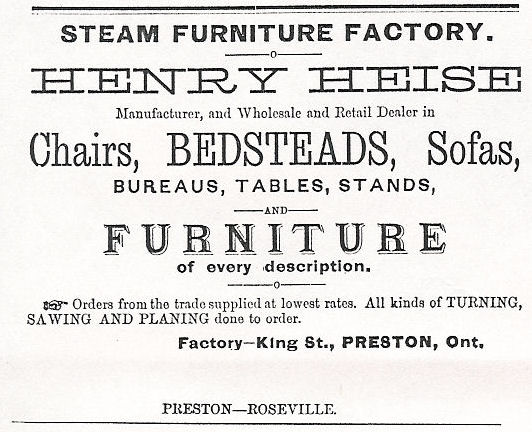

The German Immigrant Henry Heise (1842 - 1917)
Introduction
Henry's Birthplace
Private Correspondence re:Emigration
Transportation
The Heises Emigrate to Preston, Canada West
Henry Heise Becomes a Master Cabinetmaker
Henry Heise in Business for Himself
Family of Henry Heise and Dorothea Stumpfle
Descendents Remember Henry Heise
Bibliography
Late in 1863, Henry began to work independently in the family furniture business. [56] Sutherland's County of Waterloo Gazeteer (1864) lists five Heises at this site. Christoff was a turner, Christian and Henry--cabinetmakers, Charles--moulding maker, and an unknown relative named John--labourer.
An account book kept by Henry Heise for the year beginning June 6, 1866, describes his success as an artisan. The diary begins: "Sold W. Schlüler one wheel barrow, took a diary and paper in exchange; went down to Galt to get a cutter in exchange for furniture but didn't get it". The diary mentioned is probably the one in which the account was written. Henry calculated his wages at 12 1/2 cents per hour, and gross sales at $601.36. The profit margin is not clear. Following is a sample of the entries:
"Ground 9 lbs. yellow ochre @ 18 cents per lb. and 7 lbs. brown ochre @ 20 cents per lb. for Mrs. Bitschy".
"Bought 5 gallons boild (sic) oil from Eby, Bridgeport, @ $1.12 1/2 per gal."
"Bought 1423 feet common pine @ $10 per thousand and 450 feet clear @ $15 per thousand".
"Bought 32 pounds of wool from Mr. Breithaupt, total $10.66".
"Bought one envelope with stationary for 25 cents".
"Received 100 lb. flour from Mr. Hoffman on account".
"Ground 15 lbs. of paint for Mrs. Bitschy; am going to take it out tonight if it does not rain".
"Pattern for John Clare, received 50 cents".
"Received for cane seat rocking chair, $5.00".
"Received for bedstead, $2.50".
"Received for French bedstead, $5.50".
"Received for 12 upholstered chairs and rocking chair, $63.50".
"Received for sink, $3.50".
"Received for bureau, $18.00".
"Received for 2 blinds, $5.00".
"Received for washing machine, $5.75".
"Received for rolling pin and potato masher, 25 cents".
"Received for shuttle propeller, 6 cents".
"Gave one dollar to mother".
Henry Heise's diary is probably representative of his annual business during the period 1865-1880. After that time, however, "the traditional industries catering to local market disappeared, while the decline of the rural population and the improved transportation system resulted in a smaller demand for services from the villages and small towns. The large towns and industries grew at the expense of the smaller ones". [57]

56.Board of Examiners, op.cit., n.p.
57. Spelt, op.cit., p. 186.